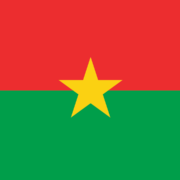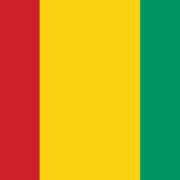West Africa
Cote d’Ivoire
Located on the coast of western Africa the de facto capital is Abidjan; the administrative capital designate (since 1983) is Yamoussoukro.
West Africa
Located on the coast of western Africa the de facto capital is Abidjan; the administrative capital designate (since 1983) is Yamoussoukro.
Population: (2024 est.) 32,065,000
Main Religion: Islam – Muslims form a 95% majority in the north.
Christians: 35.2% – the majority in the south.
The country is made up of four natural regions. The coastal fringe consists of a strip of land, no more than 40 miles (64 km) wide, studded with lagoons on its eastern half. Behind the coastal fringe lies the equatorial forest zone that until a century ago formed a continuous area more than 125 miles (200 km) wide. It has now been reduced to an area roughly triangular in shape. The cultivated forest zone east of this triangle, consists of forest land that has been partially cleared for plantations, especially along the Ghana border and in the area around Bouaké. The fourth region, the northern savanna, consists of a sparsely populated plateau, offering open ground favourable for stock breeding. About 4,500 square miles (11,650 square km) in this region have been set aside to form Komoé National Park, which was designated a UNESCO World Heritage site in 1983.
Literacy training and increase access and understanding of the Bible
Ivory Coast is a republic with a presidential multi-party system and a government with three branches: The executive, legislative, and judiciary.
Ivory Coast became an independent republic with a new Constitution in 1960. Felix Houphouet-Boigny became president and remained in office until he died in 1993. He had declared a one-party system and ruled for more than thirty years.
Ethnic and religious tensions increased in the 1990s and civil war broke out in 2002. Henri Konan Bédié succeeded Felix Houphouet-Boigny as president in 1993 and was accused of corruption and bad governance, resulting in the suspension of economic aid in 1998. In Dec 1999, the armed forces conducted a bloodless coup. Gen Robert Guei assumed power and formed a government but was forced to flee the country in October 2000 after Laurent Gbagbo declared himself the winner in the elections.
Protests soon turned into a conflict that split the country in two, with Muslim rebels in the north and government control in the Christian south. Finally, in 2010 another election was held which Alassane Ouattara won. However, Gbagbo refused to step down claiming election irregularities and a conflict ensued that led to the death of around 3,000 people. Eventually, Gbagbo was arrested and transferred to the International Criminal Court (ICC) in 2011.
In 2015, Ouattara won a second five-year term with nearly 84% of the vote. Early in 2020, Ouattara said he would not seek third term re-election, an attempt that would have needed constitutional amendment. In August 2020, however, he changed his mind and was formally elected by his party to run for the third term, a step which was validated by the country’s top court.
The constitutional court excluded former President Laurent Gbagbo from running in the presidential election (Al-Jazeera, 25 September 2020). As a result, it was just President Ouattara and ex-President Henri Konan Bédié competing for the presidential post on 31 October 2020. As reported by BBC News on 3 November 2020, Quattara won a third term with 94% of the vote.
As summarized by Freedom House in its Freedom in the World 2023 Ivory Coast report, over the past decade, the country has been working to recover from a devastating armed conflict that concluded in 2011. The nation has made some headway, particularly in the protection of civil liberties but some underlying causes of its past conflict remain. Election-related violence in 2020 marked a significant setback in this journey, yet there was a noticeable improvement in electoral conditions in 2021, permitting opposition groups and civil society to operate more openly than previously.
In summary, Ivory Coast is a country rebuilding and healing. There are many hopeful signs toward political reconciliation, but numerous challenges persist, including corruption, limited civil liberties, and continued ethnic tensions.
The US State Department (IRFR 2022 Ivory Coast) states, “Muslim and Christian leaders, including representatives of the Supreme Council of Imams, Mosques, and Islamic Affairs of Cote d’Ivoire (COSIM, the country’s main Sunni Muslim association) and the Catholic, evangelical Christian, and Methodist Churches, reported generally good relations with each other and among their communities, although there were two reported instances of local Christian and Muslim groups disagreeing over the use of land to build additional churches. Additionally, there were two localized conflicts between animists and a Christian denomination over the right to hold Christian worship services at the same time as certain animist ceremonies. The incidents involved vandalism against churches. In one case, a Christian suffered a broken collarbone.”
“Many individuals who identify as Christian or Muslim also practice some aspects of indigenous religious beliefs.”
“During the year [2022], the Muslim community, led by the National Platform for Islamic Education, successfully advocated increased accreditation of Islamic schools. The platform coordinated evaluations of 3,416 schools during the year, 547 of which received accreditation, affecting approximately 105,000 students. In addition, the Ministry of National Education and Literacy trained 2,406 Islamic school teachers on how to implement the standard national curriculum. The platform expressed optimism that the number of accredited Islamic schools would continue to grow in coming years. Islamic schools, unlike the majority of Christian schools, historically operated without formal accreditation from the Ministry of National Education and Literacy.”
It is risky for Christians with a background in Islam or traditional African religions (ATR) living with non-Christian family members to make their conversion known. The region is facing unprecedented jihadist expansion and the form of Islamic teaching that is destabilizing other West African countries is also becoming more common in Ivory Coast.
The fact that politics also has links with religion – i.e. northerners (Muslim) vs. southerners (Christian) – any political disagreement or crisis immediately bears religious connotations and hence puts Christians in a vulnerable position. At the local level, government officials are known to discriminate against Christians in the Muslim-majority northern part of the country.
Converts to Christianity in the north face social ostracization and expulsion from their communities.
Converts also encounter difficulties in obtaining land to build churches, indicating a level of institutional discrimination.
Government authorities have been known to intimidate pastors, regulating what they can and cannot preach, thereby limiting religious freedom.
In the western part of the country, Christians are often requested by animist groups to stay home during their ‘mask holidays’, thus marginalizing them from public and cultural life.
Acts of vandalism against churches have been reported in various regions, contributing to a sense of insecurity and tension within Christian communities.

 Guinea
Guinea